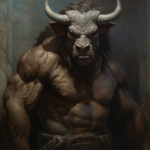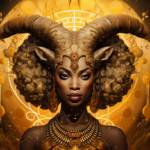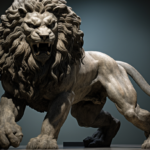Are you ready to embark on an incredible journey?
Step into the mysterious realm of the Greek Underworld and discover the secrets of the afterlife.
In this article, we will guide you through the captivating mythology, introduce you to the fearsome guardians, and unveil the fate of souls.
Explore the realms of reward and punishment, and delve into the tragic tale of Orpheus and the Underworld.
Get ready for an adventure like no other!
Key Takeaways
- The Greek Underworld, also known as Hades, is ruled by Hades himself and serves as a place of punishment and rest for souls after death.
- The journey through the Underworld involves crossing the River Styx with the help of Charon, the ferryman, and passing through the gates guarded by Cerberus.
- The Underworld is protected by terrifying guardians such as Cerberus and the Furies, who remind us of the consequences of our actions in life.
- Hades and Persephone are the rulers of the Underworld, and their annual reunion symbolizes the cycle of life, death, and rebirth.
The Mythology of the Greek Underworld
Let’s delve into the fascinating mythology of the Greek Underworld and explore its rich stories and characters.
In Greek mythology, the Underworld, also known as Hades, was the realm of the dead, ruled by the god Hades himself. This mysterious and dark realm was where souls went after death, and it was believed to be a place of both punishment and rest.
One of the most well-known tales from Greek mythology is the story of Persephone, the daughter of Demeter, the goddess of agriculture. Persephone was abducted by Hades and taken to the Underworld, where she became his queen. Her mother, Demeter, grieved for her loss and caused the earth to become barren until Persephone was allowed to spend part of the year in the world of the living.
The Greek Underworld was also home to various other mythological figures, such as Charon, the ferryman of the dead, who transported souls across the River Styx to the gates of the Underworld. These gates were guarded by the three-headed dog Cerberus, a fearsome creature that ensured that souls didn’t escape.
Now, let’s journey deeper into the Greek Underworld and learn about the process of crossing the River Styx and the gates that lead to the realm of the dead.
Crossing the River Styx: A Guide to the Underworld Gates
Navigating the treacherous journey through the Greek Underworld, you’ll encounter the River Styx and its formidable gates. As you approach the dark, murky waters of the Styx, you can feel the weight of the afterlife pressing upon you. This is the river that separates the land of the living from the realm of the dead, and it’s said that the passage across its waters is an essential step in the journey to the afterlife.
To cross the River Styx, you must seek the guidance of Charon, the ferryman of the underworld. Charon’s boat is the only means of transportation across the river, and he demands payment for his services. In Greek mythology, the deceased were buried with a coin under their tongue to pay for the ferry ride. Without this payment, souls were doomed to wander the shores of the Styx for eternity.
Once on the other side of the river, you’ll come face to face with the imposing gates of the Underworld. These gates are guarded by Cerberus, the three-headed hound with a serpent for a tail. Cerberus is a fearsome creature, but with the right approach, you can gain passage through the gates.
Prepare yourself for the challenges that lie ahead as you venture deeper into the Greek Underworld, where freedom awaits those who dare to explore its mysteries.
Meeting the Guardians: Exploring the Underworld’s Fearsome Creatures
As you journey deeper into the Greek Underworld, prepare yourself to come face to face with its terrifying guardians. These mythical creatures of Hades aren’t to be taken lightly, for they possess immense power and are tasked with protecting the realm of the dead.
Confronting these fearsome underworld beings will test your courage and strength, as you navigate through the treacherous depths of the afterlife.
Underworld’s Terrifying Guardians
Prepare yourself for a spine-chilling encounter with the underworld’s terrifying guardians.
As you descend into the depths of Hades, you’ll come face to face with creatures that will test your courage and strength.
These fearsome beings are tasked with protecting the gates of the underworld, ensuring that only the dead may enter and the living may not escape.
The three-headed dog, Cerberus, guards the gates, his snarling jaws ready to devour anyone who dares to trespass.
The Furies, with their serpent hair and bloodshot eyes, lurk in the shadows, ready to unleash their wrath upon those who’ve committed grave sins.
These guardians, with their monstrous forms and fierce demeanor, remind us of the consequences of our actions in life.
As we delve deeper into the realm of Hades, let’s now explore the mythical creatures that dwell within.
Mythical Creatures of Hades
Get ready to encounter the mythical creatures of Hades as you meet the fearsome guardians of the underworld.
As you venture deeper into the abyss, prepare yourself for a chilling encounter with creatures that defy imagination.
First, you’ll come face to face with Cerberus, the three-headed hound that guards the gates of the underworld. Its ferocious growls will send shivers down your spine, but fear not, for you’ll be protected by the wisdom of Hermes, the messenger of the gods.
Moving further, you’ll encounter the fearsome Furies, ancient goddesses of vengeance. Their piercing cries will echo through the darkness, reminding you of the consequences of your actions.
Confronting Fearsome Underworld Beings
Step boldly into the depths of the Greek underworld, where you’ll face the guardians and encounter the fearsome creatures that lurk within. As you traverse this treacherous realm, be prepared to confront the following underworld beings:
- Cerberus: The three-headed dog guards the gates of the underworld, ensuring that no one escapes its clutches. With its ferocious bark and sharp teeth, it’s a formidable opponent.
- Charon: The ferryman of the dead will guide you across the river Styx, but only if you pay the toll. His skeletal figure and piercing gaze will send shivers down your spine.
- Furies: These vengeful spirits of the underworld are relentless in their pursuit of justice. With their snakelike hair and bloodcurdling screams, they strike fear into the hearts of mortals.
- Hades: The ruler of the underworld himself, Hades, is a fearsome entity to behold. With his dark cloak and cold demeanor, he commands respect and holds the power over life and death.
Prepare yourself for these encounters, as you venture further into the Greek underworld and face the guardians and creatures that await you.
Embrace the freedom to confront your fears head-on and emerge victorious.
Hades: The Ruler of the Underworld
Now it’s time to delve into the role of Hades, the ruler of the Underworld. As you explore the Greek mythology, you’ll discover that Hades isn’t just a feared and powerful deity, but also a husband to Persephone, the goddess of spring.
Together, they hold the key to the realm of the dead, surrounded by mythological creatures that guard their domain.
Hades and Persephone’s Roles
Discover how Hades, the powerful ruler of the Underworld, governs the realm of the dead alongside his wife Persephone. Together, they play crucial roles in maintaining order and balance in the Greek afterlife. Here’s what you need to know:
- Hades: As the ruler of the Underworld, Hades ensures that the souls of the deceased are properly judged and assigned their rightful place in the afterlife.
- Persephone: As Hades’ wife, Persephone serves as the Queen of the Underworld. She brings compassion and mercy to the realm, providing comfort to the souls who’ve passed on.
- Guardians of the Underworld: Hades and Persephone are assisted by a host of loyal servants, including the three-headed dog Cerberus, who guards the gates of the Underworld.
- The Seasons: Persephone’s annual return to the surface world marks the changing of seasons, symbolizing the cycle of life, death, and rebirth.
Together, Hades and Persephone ensure that the Underworld functions smoothly, maintaining the delicate balance between life and death.
Mythological Creatures in Hades
Encounter fascinating mythological creatures as you venture into Hades, the ruler of the Underworld. As you explore this dark realm, be prepared to come face to face with creatures that both amaze and terrify.
The first creature you may encounter is Cerberus, the three-headed dog guarding the gates of Hades. With its sharp teeth and ferocious growls, Cerberus is a formidable sight.
Moving deeper into the Underworld, you may come across the Furies, fearsome winged goddesses of vengeance. Their piercing screams and fiery eyes strike fear into the hearts of all who cross their path.
Finally, beware of the Chimera, a creature with the body of a lion, the head of a goat, and a serpent’s tail. Its presence is a reminder of the power and diversity of the mythological creatures within Hades.
The Judgment of the Dead: Unveiling the Fate of Souls
As you enter the realm of the Greek Underworld, you’ll witness the divine judgment that determines the fate of countless souls. Here, in this realm of mystery and power, the souls of the departed come face to face with their destiny. The judgment of the dead is a pivotal moment, where the deeds of a lifetime are weighed and the consequences are unveiled.
In this sacred place, the fate of souls is determined by the gods themselves. As you observe this awe-inspiring process, you’ll come to understand the intricacies of the divine judgment. The gods, in their wisdom, consider various factors before deciding the ultimate fate of each soul.
- The actions and choices made in life
- The level of virtue or vice displayed
- The impact left on the mortal world
- The degree of devotion to the gods
Through this divine judgment, the souls are assigned their rightful place in the afterlife, be it in the realms of reward or the realms of punishment. As you delve further into the Greek Underworld, you’ll explore the contrasting realms of Elysium and Tartarus, where the souls experience their well-deserved rewards or punishments.
Elysium and Tartarus: Exploring the Realms of Reward and Punishment
As you delve deeper into the Greek Underworld, you’ll come across the realms of Elysium and Tartarus, where the souls are either rewarded or punished for their actions in life.
Elysium, also known as the Elysian Fields, is a paradise reserved for those who led virtuous lives. Here, the souls of the righteous are granted eternal peace and happiness. Imagine a place where you can bask in the warm sunlight, surrounded by lush green meadows and fragrant flowers. It’s a haven of tranquility, where you can indulge in your wildest dreams and desires, free from the burdens of the mortal world.
On the other hand, Tartarus is the realm of punishment, where the souls of the wicked are condemned for eternity. Picture a dark and desolate abyss, where the air is heavy with despair and suffering. It’s a place of eternal torment, where the guilty are subjected to unimaginable torture that matches the severity of their crimes. Here, you’ll witness the consequences of their immoral actions, as they endure a never-ending cycle of punishment.
In the Greek Underworld, the realms of Elysium and Tartarus serve as a reminder that our actions in life have consequences. It’s a testament to the belief that justice will be served, rewarding the righteous and punishing the wicked.
Orpheus and the Underworld: A Tale of Love and Tragedy
Immerse yourself in the captivating tale of Orpheus and his journey into the Underworld, a story filled with love, sorrow, and tragic consequences.
- Orpheus, a gifted musician, ventures into the realm of the dead to bring back his beloved wife, Eurydice, who tragically died on their wedding day.
- Armed with his lyre, Orpheus charms the guardians of the Underworld with his enchanting melodies, gaining passage to the realm of Hades.
- Moved by his heartfelt plea, Hades grants Orpheus permission to lead Eurydice back to the land of the living, on one condition: he mustn’t look back until they’ve reached the surface.
- Consumed by love and longing, Orpheus can’t resist the urge to look back, losing Eurydice forever.
Orpheus’ journey serves as a cautionary tale about the consequences of succumbing to temptation and the fragility of love. It reminds us that even the strongest bonds can be shattered by a single moment of weakness.
The story of Orpheus and the Underworld resonates with us, reminding us of the power of love and the importance of cherishing what we have, for it can be lost in an instant.
Frequently Asked Questions
What Are Some Common Rituals or Practices Associated With Honoring the Deceased in Ancient Greece?
Some common rituals or practices associated with honoring the deceased in ancient Greece include offering food and drink to the spirits, performing libations, and holding funeral ceremonies with mourners and musicians.
How Did Belief in the Greek Underworld Influence Daily Life and Societal Norms in Ancient Greece?
Belief in the Greek underworld shaped daily life and societal norms in ancient Greece. It influenced how people treated the deceased, affected their moral choices, and guided their understanding of the afterlife.
Are There Any Known Historical Figures Who Were Believed to Have Crossed Into the Greek Underworld and Returned?
Did anyone famous make it out of the Greek underworld? Well, there are historical figures, like Orpheus and Heracles, who were believed to have ventured into the underworld and returned to the land of the living.
How Did the Greek View of the Afterlife Differ From Other Ancient Civilizations?
The Greek view of the afterlife differed from other civilizations in its belief in a complex underworld ruled by Hades. Souls were judged and sent to different realms based on their actions in life.
Are There Any Modern-Day Beliefs or Practices That Can Be Traced Back to the Greek Concept of the Underworld?
Modern-day beliefs and practices, influenced by the Greek concept of the underworld, can still be found. You’ll discover remnants of these beliefs in various cultures, from the belief in an afterlife to the concept of judgment and punishment.







